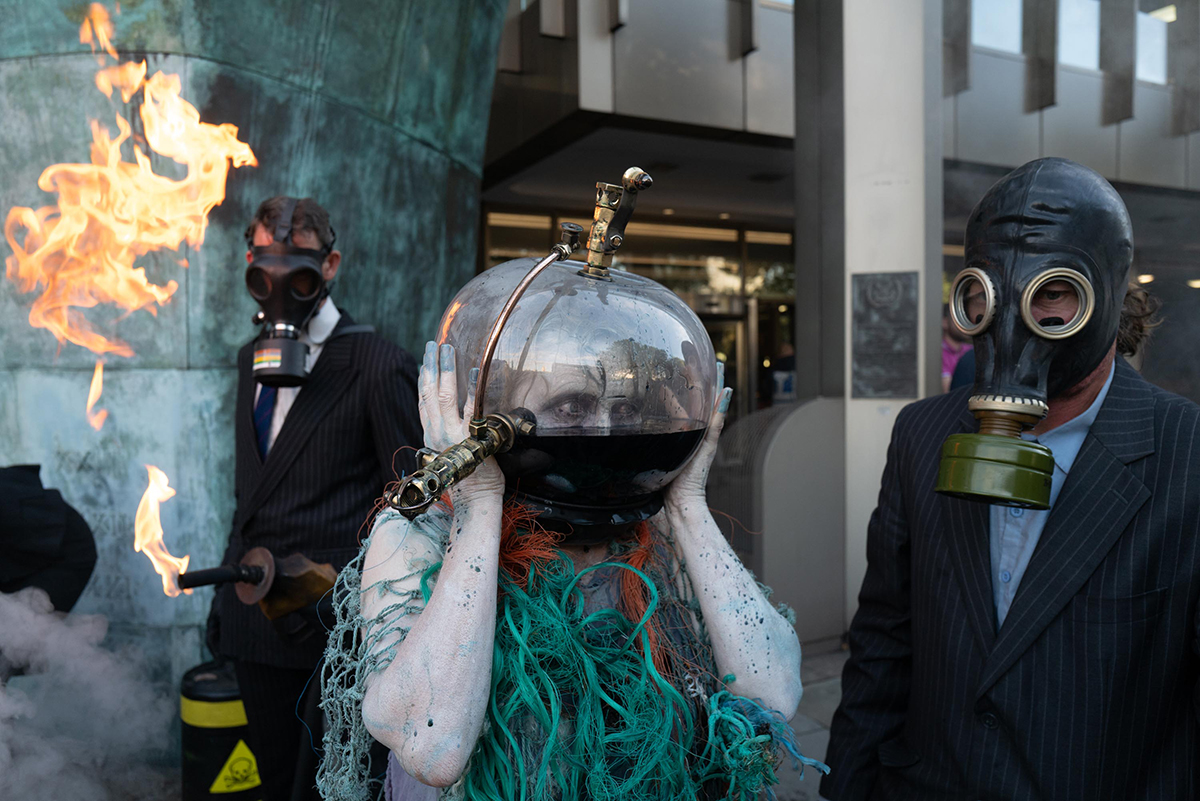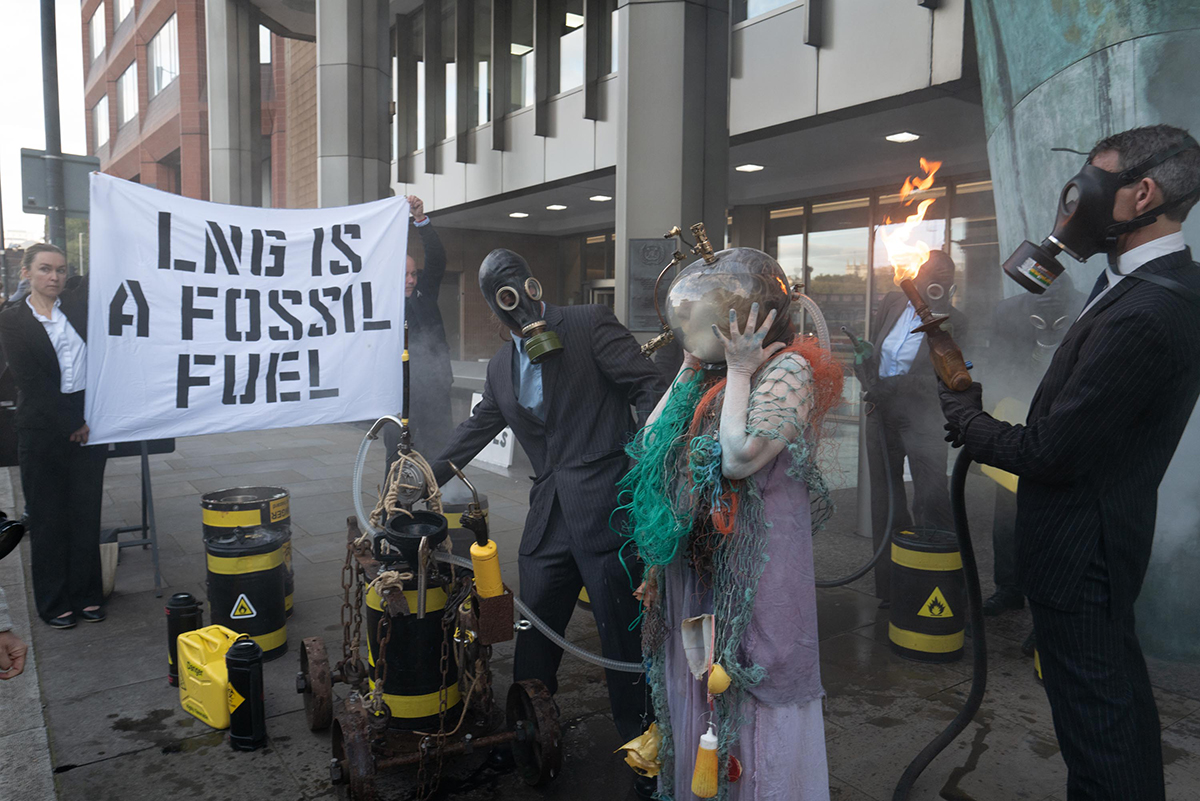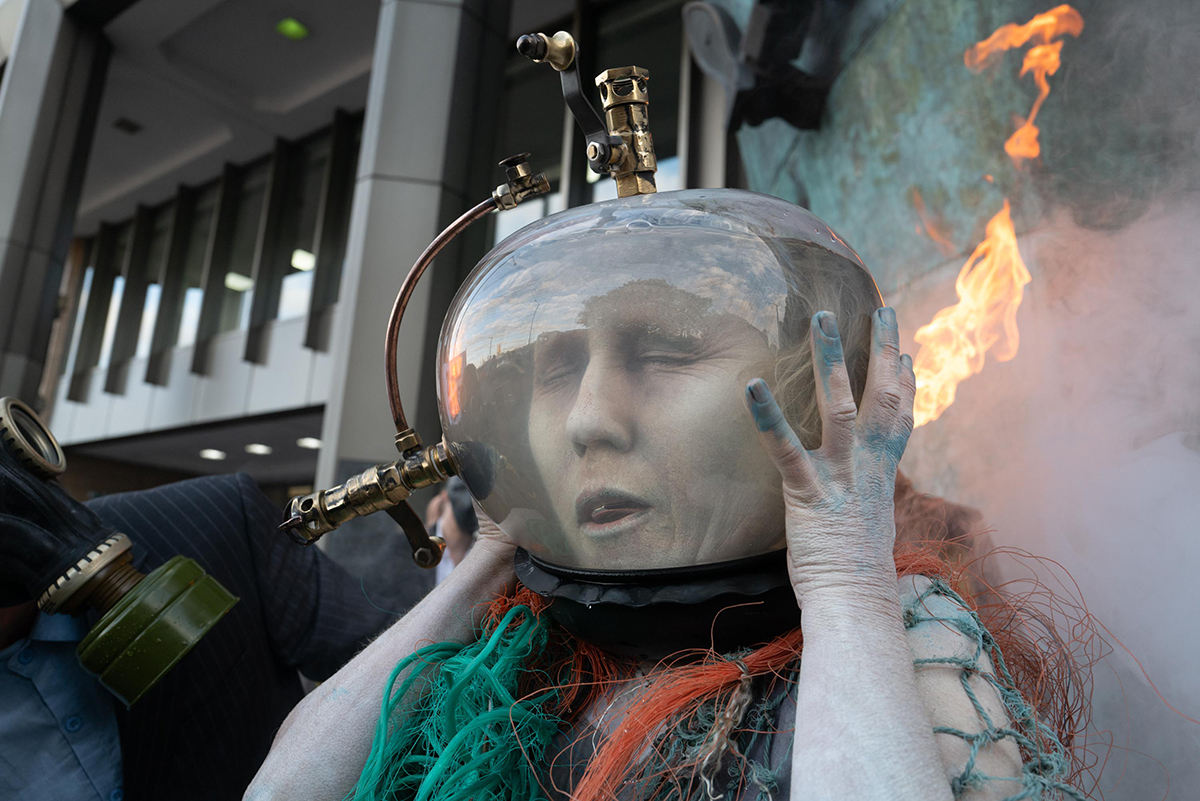DROWNING IN LIES
04.10.2024

A Sea Goddess drowning in Liquid Natural Gas1, a wall of flames and a group of mysterious representatives from the oil and gas industry – Ocean Rebellion creates a scary tableau of pain to highlight the greenwashing of Liquid Natural Gas (LNG) by SEA-LNG and some Member States of the UN International Maritime Organisation (IMO).
Alongside the International Memorial to Seafarers on the Albert Embankment, our artists revealed a striking new performance aimed at shedding light on the severe crisis gripping the shipping industry.

⬆️ As the helmet fills the Goddess dies. LNG’s dirty lies are driving the IMO down a highway to hell. Photo João Daniel Pereira.
The performance’s centrepiece was the ‘drowning’ of an oceanic goddess, her head captured inside a translucent helmet, a fishbowl prison slowly filling with death. Gas-masked figures from Shell LNG, a member of SEA-LNG, used machinery to slowly fill the helmet with LNG, submerging her. On either side, jets of flame and oil erupted from nozzles wielded by the Oil and Gas executives. The performance culminated with the goddess’s complete submersion—an indictment of the IMO’s failure to protect the oceans, their continued manipulation by the fossil fuel and shipping industry, and a poignant prelude to the final day of the MEPC82 meetings.
The fate of the Ocean depends on us all.
Our interventions depend on your support.

⬆️ LNG is a fossil fuel, it’s that simple. Photo João Daniel Pereira.
By hiding behind reports on bioLNG, SEA LNG has been very successful in selling LNG as a green fuel, even though bioLNG is expensive and rare (meaning fossil LNG is the gas of choice) and still causes methane emissions throughout its supply chain and use.
They have been so successful that companies like Maersk, Royal Caribbean, and MSC have been promoting their ships as ‘green’ and selling this lie to the general public. LNG is not a green fuel. What’s more the IMO is convinced by this lie and is doing nothing to stop LNG becoming the fossil fuel of choice for shipping. In the European Union alone, consumption of LNG by ships has doubled from 2.2 million tonnes (Mt) in 2018 to 4.4 Mt in 2022. LNG uptake is based on the deceptive notion that it is an alternative, clean fuel. This is where LNG proponents are engaging in gaslighting, deceiving the maritime sector and all of us.
Gaslighting is a form of psychological manipulation used to make you doubt your own perceptions and sanity, often by distorting facts or reality. LNG fans are employing gaslighting tactics, like funding research and selectively citing studies that support their narrative while discrediting researchers highlighting LNG’s risks. They are also undermining dissenting community voices and opinion leaders by labelling them as “alarmists” or “obstructionists.”

⬆️ Gaslighting by SEA-LNG is both misleading and potentially illegal for members given the FCA’s recent rules demanding ‘services are accurately described’. Photo João Daniel Pereira.
By being members of SEA-LNG companies like Shell LNG, Lloyd’s Register and Maersk, are engaging in gaslighting while making sustainability claims. This may be violating their legal responsibilities to shareholders and risk litigation if such material risks, including the litigation risk, are not properly reflected in their audited accounts. Likewise, credit rating agencies which fail to detect this greenwashing are also failing to give accurate sustainability readouts to their subscribers in the financial sector.
Not to mention any failure of ethical responsibilities to wider stakeholders to avoid collapsing climate, nature and society by means of fugitive methane, and fossil carbon emissions, that result from LNG. Far from clean, LNG is one of the dirtiest fuels there is. Touting it as a clean fuel is a technological lie.

⬆️ The Sea Goddess takes a final breath before succumbing to the toxic mixture of Fossil and Bio LNG. Photo João Daniel Pereira.
Liquid Natural Gas (LNG) – the facts
LNG is a fossil fuel that, when extracted, transported and burnt as a marine fuel, leaks methane into the atmosphere – a dangerous global-warming gas that is over 80-times more climate-warming in the short-term than carbon dioxide.
The UN’s Intergovernmental Panel on Climate Change (IPCC) identified rapid methane emission cuts as one of the top priorities in order to limit global warming to as close to 1.5°C as possible. The IPCC’s latest report focusing on climate mitigation makes clear that fossil gas in the form of LNG is not a solution for shipping’s decarbonisation.
Contrary to what climate science requires, shipping and port companies have been going full steam ahead in the wrong direction, investing heavily in fossil LNG, alleging that the fuel will reduce their environmental impacts and climate pollution. There are currently over 785 new cargo ships on order globally, with over 400 being built to run on fossil LNG.
Burning more fossil LNG onboard vessels is a disaster in the making for our planet. It would only increase methane emissions from ships, which already rose by 150% between 2012 and 2018, according to the UN International Maritime Organisation (IMO).
Methane emissions also decrease air quality and the increased demand for LNG—including in the marine sector—leads to adverse land-based impacts, such as polluted drinking water, reduction in crop production, and higher premature death rates.

⬆️ A disguised gas executive from Shell LNG demonstrates how LNG flares happen (all the time) using an oil pump. Photo João Daniel Pereira.
We Need Strong Methane Regulations at the IMO
According to the IPCC (AR6), addressing the climate emergency and its devastating impacts on people requires urgently tackling methane emissions in the near term. LNG proponents are gaslighting policymakers about the real size of the climate and health impacts of LNG while jeopardising a liveable future on this planet.
The International Maritime Organisation is the United Nations body regulating international shipping. Currently, no specific international regulations exist for methane emissions from ships.
Call for action at the IMO:
LNG is a fossil fuel that negatively impacts people, the environment, and the climate at every stage of its life cycle.
We demand:
1. The Member States of the IMO recognise this fact and stop listening to the SEA LNG lobbyists.
2. All companies involved in the promotion of LNG are scrutinised to establish if this is a breach of their Environmental Sustainability Goals.
3. The IMO to promote efficiency and the use of sail and electrically powered vessels by incentivising uptake in the shipping sector, empowering and upskilling workers and introducing fairer shipping routes.


⬆️ The World is dying before our eyes. Photo João Daniel Pereira.
1. Unlike SEA-LNG we don’t lie about what we do. We did not use LNG to drown the Sea Goddess – that would be murder. Instead we used harmless water.